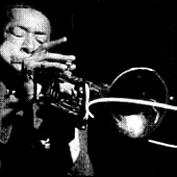 |
Lee MorganTrumpet |
|---|
 |
Lee MorganTrumpet |
|---|
"I must say that I was very influenced by Lee Morgan's recording of 'The Sidewinder.' Lee was very influential to me growing up."
--Archie Shepp
When Lee Morgan first burst onto the New York jazz scene in the mid-1950s, I was struck by the particularly clear relationship between the young trumpeter's musical style and his style off the stand. Like his playing, Lee was brisk, witty and strutting with confidence. Underneath the often mocking way of talking there was also, however, a very clear awareness on his part of the distance he still had to go. He listened hard to everything going on around him, and he was quite lucid in verbalizing his goals. Among those goals were greater clarity of line and depth of emotion.
"I always played a lot of notes," Lee told British writer Valerie Wilmer in 1961, "and now I'm getting space and those long lines. You want a change of sound, like trying to play little songs on a song, and that kind of thing. Miles Davis is a beautiful example of simplicity but that's not what I want. I want to play all over the horn and have a big beautiful sound."
In the early 1960's, Lee was developing along those lines, and it was intriguing to hear him gradually discipline his formidable technical command toward more diversified expressive ends. Then Lee went through a period of relative inactivity on the jazz scene until he reappeared once more in New York in the summer of 1963. In February of 1964, Lee went back on the road with Art Blakey's Jazz Messengers with whom he had been previously.
Listening to the renascent Lee Morgan in these perfomances recalls a statement Lee made a few years ago when somebody congratulated him on his style. "I don't think I have a completely original style," he said candidly at the time, "though I do have an identity. An identity is when someone who knows jazz can say, 'that's Lee Morgan playing,' but my basic style is composed of a strong Fats Navarro/Clifford Brown influence, and Miles and Dizzy, and then again a Bud and Bird thing. I think a definite style comes with living and experience and travelling until you play what you are, you play yourself on the horn."
The Lee Morgan identity remains strong, and on the basis of his work here, the Lee Morgan style is indeed becoming definite. One of the elements in Lee's playing which has always been particularly engaging is the sense he projects of the sheer fun of improvising, the pleasure of making an instrument and extension of yourself. And now that he is able to feel and say more emotionally with a technique that is already so secure, his thrust of delight at being able to thoroughly command his horn is all the more heightened.
At the beginning of his career, Lee Morgan was impressive in terms of the carefree ebullience of his spirit and his often dazzling technique. To this listener, the current Lee Morgan is more impressive because in the past eight years, Lee has considerably expanded his knowledge about himself; and consequently, his music encompasses a broader and, I feel, a deeper range of emotion. The ebullience often reasserts itself, but it has been tempered with an awareness of the shadows as well as the kicks of being part of this complexly demanding era. The technique is more fluid than it ever was, but it is no longer indulged in for its own careening sake. My point is that the Lee Morgan identity has become a great deal clearer to him and at the same time, the need to fully communicate that identity through his music is enabling him to forge an increasing unmistakably and resourceful style.
--IRA GITLER, from the liner notes,
Search For The New Land, Blue Note.
A selected discography of Lee Morgan albums.
| Find Lee Morgan on Amazon.com | Find Lee Morgan on eBay.com | |
|---|---|---|
| Lee Morgan CDs on Amazon | Lee Morgan CDs on eBay | |
| Lee Morgan LPs on eBay | ||
| Lee Morgan BOOKs on eBay | ||
| Lee Morgan DVD / VHS on eBay |
 Music |
 Home |
 Musicians |
|---|
|
Any comments, additions or suggestions should be adressed to:
The Hard Bop Homepage / Eric B. Olsen / ebolsen@juno.com |
Other Web Sites:
The Film Noir 'net A History of Horror The War Film Web Author Eric B. Olsen |